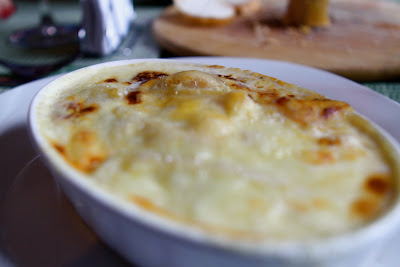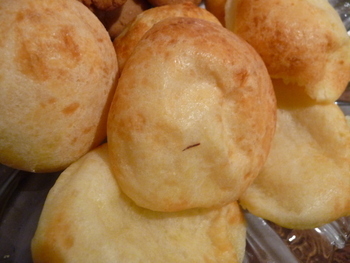LORCA - Santa Cruz, Bolivia

We order a cup of coffee and hot chocolate to stave off the freezing cold. Whoever thinks South America is a tropical paradise has never come here during the winter (summer for the U.S. is winter in South America, and vice versa).
She's good friends with the manager, Ubaldo Nallar, who is also an actor, producer, theater director, dramaturge, and cultural manager. Felipe Ibarreche, who is also the Bachelor of Tourism and Cultural Heritage Conservation expert, is the mixologist and part of Lorca's administrative team.
Ana Carola is there around three times a week and gushes that it's expanded to two stories, and outdoor area, and many indoor quarters. At night, a dj spins and it becomes a lively hot spot with the local artsy crowd, very open to foreigners, and a go-to spot for the Santa Cruz elite.
Lorca, named after Federico del Sagrado Corazón de Jesús García Lorca (talk about a long name), the famous Spanish poet, dramatist and theatre director (sense a pattern here?) is known for their French-Arabian food and a huge wine list as well as opening up their space for theatre plays, concerts, art exhibits and auctions, record releases, workshops and indie film screenings. Talk about an artist's haven!
The moment we enter Lorca, we are enveloped by the bold interiors. The first room we are in is painted in green, orange, and red, with a gold-rimmed chalkboard menu, contrasting paintings, vintage hookahs on the bar, and some tables and chairs.
Rounding the corner is the outdoor patio area, speckled with red chairs. The black, white, and red decor matches their bold logo design. Along with the Spanish style architecture of the building, which is right next to the Plaza and the historical church of Santa Cruz, I feel like I'm transported to another time, another place. Wait, I technically am...
Lorca has wine from all over the Americas, Europe, etc. They even have Bolivian wine, which is amazing since I never knew Bolivia even made wines.
Most of the paintings at Lorca are done by local artists in Santa Cruz, or traveling artists who have come and gone.
There are many different rooms at Lorca. The one below has interesting decals. I believe this is the hookah room.
We start with the Foie Gras ($14 USD) accompanied by local Bolivian bread. This is straight from France, imported by a local.
Ubaldo asks what I'm in the mood for and I tell him that I want something warm and comforting. I get the Tartiflette ($6 USD), a French dish from the Haute Savoie. I've never heard of this particular dish so I'm excited. It's like scalloped potato/potato au gratin's older, more voluptuous sister who gets more ass. It's made with potatoes, white wine, cheese, bacon, onion, and cream. In this version, a small fingerling variety of potatoes were used rather than slicing large potatoes. Did you know that Bolivia has over 200 varieties of potatoes and that potatoes originated from South America?
My husband is an adventurous eater when we travel. He vowed to try a llama burger and other exotic meats while in Bolivia so he was game for the alligator tail ($8 USD). The alligator tail is breaded and fried, with an oyster sauce. It's reminiscent to tang soo-yook, a Korean version of a Chinese dish that I could never find in a real Chinese restaurant. It's basically a dense tempura of a meat of your choice with a sweet and tangy sauce over it. The potatoes were soft and delicious.
Lorca has tons of wine from all over South America, the U.S, and other places but because I never tried Bolivian wine nor knew that Bolivia made wine, it was the perfect day for my first sip of Bolivian wine. Truth be told, it isn't the best wine but I've also had worse so for being patriotic since we were a few days away from Bolivian Independence Day, it fit the bill.
Lorca has interesting desserts (mostly $3 USD). Both of the ones we got are yogurts that are gelled with agar, topped with fruit. The first is called Federico and the berries on top tasted like black currants - definitely more tart and bitter than blackberries or its counterparts.
My favorite dessert is the Aladino, or the Aladdin, which is also yogurt with agar to make it gel up into this thick pudding consistency but the yogurt itself is infused with rose water so it has a floral scent to it, which is intoxicating. The dates add the sweetness to it and conceptually, it really does live up to its name. Some trivia: my dad's Bolivian name is Aladino (after his textile store). Hence, this is doubly special to me.
Ana Carola gets the Almendrado, which looks like a tiramisu of some sort but it's actually homemade vanilla ice cream with almond praline. Bolivia's ice creams are amazingly creamy, delicious, and completely natural. One of the biggest expanding businesses in Bolivia is Piccolo, an heladeria (ice cream parlor).
Lorca is a definite must-eat and must-see in Santa Cruz. It represents the rise of contemporary culture in Santa Cruz, and the food is made with local ingredients as well as exotic ingredients from abroad. It's at the epicenter of the cool, with global past times like smoking hookah and dancing the night away as part of their agenda - you never have to leave! On any given weekend, Lorca is packed with young, hip, amazingly beautiful people and it's located in the heart of El Centro. After eating at Lorca, you can cross the street to the plaza on a weekend to watch impromptu tango dancing, go souvenir shopping at the artisanal stands behind the church, or hang out on the benches with your friends, enjoying the hot coffee from the coffee vendors. Too bad the sloths are gone. They used to provide lots of entertainment but they've since been moved to the zoo.
Lorca
Sucre # 8 Esq. René Moreno
Santa Cruz de la Sierra - Bolivia
Phone: (00-591) - 3 - 334 - 05 62


























Comments